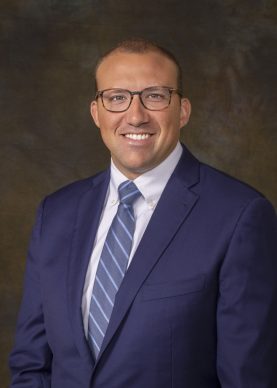Diagnosis and Treatment of Degenerative Disc Disease in Wake County

What is Degenerative Disc Disease?
Despite what the name suggests, degenerative disc disease is not a disease, but a condition in which natural, age-related wear-and-tear on a disc causes pain, instability, and other symptoms. Disc degeneration is a natural part of aging, and over time everyone will exhibit some changes in their discs. However, a degenerating disc does not always cause symptoms.

What Causes Degenerative Disc Disease?
The spinal discs, which act like shock absorbers between the vertebrae of the spine, begin to break down and may not work as well with age. The discs change in ways that may cause degenerative disc disease, such as:
- Drying out: With the increase in age, the spinal discs can start losing water and get thinner. Flatter discs cannot absorb shock as well.
- Cracking: Stress from everyday movements or minor injuries can cause tiny tears in the walls of spinal discs. The soft core of the disc may push through the cracks or tears and affect nearby nerves in the spine, causing pain.
Degenerative disc disease most commonly occurs in the cervical spine (neck) or the lumbar spine (lower back), as these areas of the spine undergo the most motion and are most susceptible to wear and tear.
Symptoms of Degenerative Disc Disease
A degenerating spinal disc does not always lead to pain or other symptoms. Pain usually occurs when the degenerating disc affects other structures in the spine (such as muscles, joints, or nerve roots close to the spinal disc). Inflammation can produce muscle tension, muscle spasms, and local tenderness in the back or neck. If a nerve root becomes inflamed, pain and numbness may radiate into the arm and shoulder (called cervical radiculopathy in cases of cervical disc degeneration), or into the hips or leg (called lumbar radiculopathy, in cases of lumbar disc degeneration).
Common symptoms of degenerative disc disease include:
- Pain in the neck or back related to activity
- Severe episodes of back or neck pain that can last a few days to months
- Pain that lessens with frequent position changes
- Pain that lessens when walking or running and worsens with prolonged sitting or standing
- Pain that is in the center of the back or neck that is not particularly worse on one side or the other; It tends to not radiate down the legs below the knee or into the arms from the neck
How is Degenerative Disc Disease Diagnosed?
When diagnosing degenerative disc disease, your healthcare provider may conduct a physical exam to test your nerve function, pain level, and strength. To test for nerve function, a doctor may use a reflex hammer to test your reflexes. If you have damaged nerves, there will be little to no reaction to the test. In order to determine your pain level, a doctor may press down on specific locations of your back to find out which area hurts the most. Testing for strength is also very important, as muscle weakness could be a sign of a damaged disc. Imaging tests such as X-rays, CT, or MRI can also show your healthcare provider your disc alignment.

Treatment for Degenerative Disc Disease in Wake County, NC
Treatment for degenerative disc disease is usually nonsurgical and includes:
- Ice or cold treatment: Applying ice or a cold pack to a painful area of the spine can relieve pain by reducing inflammation, which can be helpful following exercise or activity.
- Heat therapy: Using heat from a heating pad, warm bath, or other heat source can relax the surrounding muscles and reduce tension and spasms.
- Medication: Over-the-counter pain relievers like aspirin or ibuprofen can help fight inflammation to ease pain.
- Physical Therapy: Specific exercise and rehabilitation can strengthen the neck and back muscles to give the spine more support and flexibility. The goals of exercise are to help the spine heal and prevent or reduce further recurrences of pain.
- Epidural Steroid Injections: A steroid injected around the spine’s protective outer layer, or epidural space of the spine, can provide temporary pain relief, which helps to improve mobility.
In extreme cases of degenerative disc disease, a spinal fusion or artificial disc surgery may be necessary. It is important to be evaluated by an experienced surgeon. The board-certified, fellowship- trained spine surgeons at Raleigh Orthopaedic are committed to providing the highest quality spine care to all of our patients, treating all manner of spine conditions. Our goal is to empower the patient with the tools they need to return to their highest level of function.

What is Recovery from Degenerative Disc Disease Surgery Like?
Recovery timelines depend on the type of surgery required to treat your case of degenerative disc disease. In most cases, physical therapy is utilized in the first few weeks after surgery to strengthen the muscle groups that support the spine, including the abdomen, thighs, and buttocks. In certain scenarios, a back or neck brace is required for additional support after surgery, with medication used to manage pain. It is important to refer to your healthcare provider when outlining a recovery plan after surgery.
Can I Prevent Degenerative Disc Disease?
The progression of spinal degeneration can be prevented or slowed by making certain lifestyle changes. Stretching and strengthening your back and core muscles using exercise is one of the most common ways to prevent degenerative disc disease. It is also important to maintain a healthy body weight so there is less stress being put on your spine. Smoking tobacco is known to constrict blood vessels and prevent nutrients from getting to the discs, so it is important to avoid or quit smoking if you are looking to reduce your likelihood of spinal degeneration.

Neck and Back Pain Treatment at Raleigh Orthopaedic
Raleigh Orthopaedic is proud to be Wake County’s oldest and most experienced orthopedic practice. If you are experiencing orthopedic symptoms or pain that disrupts your daily activities, we encourage you to book an appointment online or give us a call today. If your injury or condition is recent, you can walk right into one of our Raleigh Orthopaedic Urgent Care locations for immediate care. Don’t wait – contact us for the orthopedic care you deserve today!

